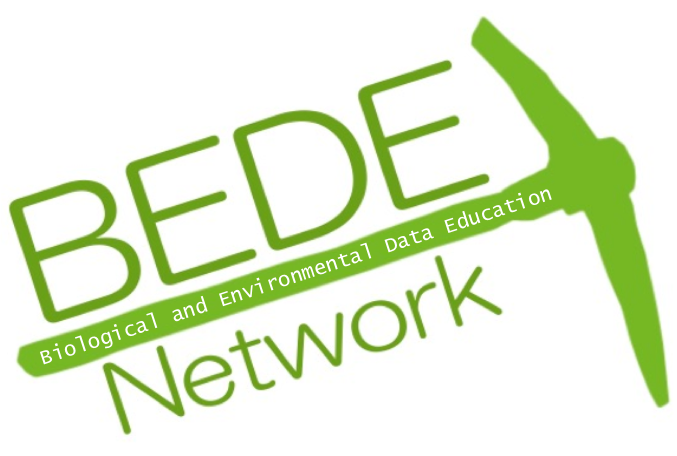The Biological and Environmental Data Education (BEDE) Network is a motivated community of scientists and educators dedicated to integrating data science skills into undergraduate biology and environmental science curricula. We aspire to be an inclusive and welcoming community for people from diverse career stages, roles, backgrounds, experiences, and perspectives.
We’re here to help you level-up.
Educators who prepare materials, teach, and mentor undergraduate students face challenges as biological and environmental science fields get more complex and the need for data intensive skills has increased. BEDE Network can help you incorporate data science and quantitative skills into your undergraduate curriculum, and respect the time you have available. We have three main ways we can meet you where you are using (1) connections, (2) programming, and (3) tools to drive the change we hope to achieve.
We want instructors to feel more capable and confident when teaching data science skills to ensure that data science is accessible for all undergraduate students in the life and environmental sciences.
The vision of the Biological and Environmental Data Education (BEDE) Network is to use data science education to make the biological and environmental sciences more accessible, transparent, reproducible, and relevant. We believe these improvements will better equip all undergraduate students with research methods and skill sets that prepare them for a career and their future success.
We want to work together to help all of us gain new ideas for the classroom.
The mission of the BEDE Network is to build a community of motivated scientists and educators that can learn together. We hope this community of practice empowers undergraduate biology instructors with the necessary skills to teach concepts and methods used by data scientists and equips instructors with best practices and pedagogical techniques to effectively teach data science to undergraduate students. We aim to support instructors as they integrate data science skills across undergraduate biology and environmental science curricula.
Objective |
Activity |
| Connections |
- Read quarterly newsletter updates - Slack channel engagement - Annual BEDE Network Meetings |
| Programming |
- Faculty Mentoring Network - Training workshops - Opportunities to contribute to governance and decision-making - Contribute to a subcommittee or working group |
| Tools |
- Curriculum map - Research projects to quantify current practices - Find Open Educational Resources (OERs) |
Steering Committee:
- Matthew Aiello-Lammens (Principal Investigator; Pace University)
- Erika Crispo (co-PI; Pace University)
- Nathan Emery (co-PI; University of California Santa Barbara)
- Kelly O'Donnell (co-PI; Macaulay Honors College, City University of New York)
- Sarah Supp (co-PI; Denison University)
- Ellen Bledsoe (University of Arizona)
- Laura Broughton (Bronx Community College, City University of New York)
- Olga Calderon (LaGuardia Community College, City University of New York)
- Sam Donovan (University of Pittsburgh)
- Kait Farrell (University of Georgia)
- Daniel S. Katz (University of Illinois at Urbana-Champaign)
- Drew Kerkhoff (University of Puget Sound)
QUBES Project
The mission of the Quantitative Undergraduate Biology Education and Synthesis (QUBES) project is to improve learning opportunities for all students enrolled in undergraduate biology courses by reflecting the centrality of quantitative approaches in modern biology [more information]. One of the ways that QUBES promotes quantitative approaches is by partnering with existing projects and communities to facilitate the discovery and use of their materials [more information].
BEDE Network / QUBES Collaboration
BEDE Network and QUBES have joined forces to:
- Provide a platform for sharing pedagogical materials.
- Host discussions about best practices in data science education.
- Connect members and build a larger community.
